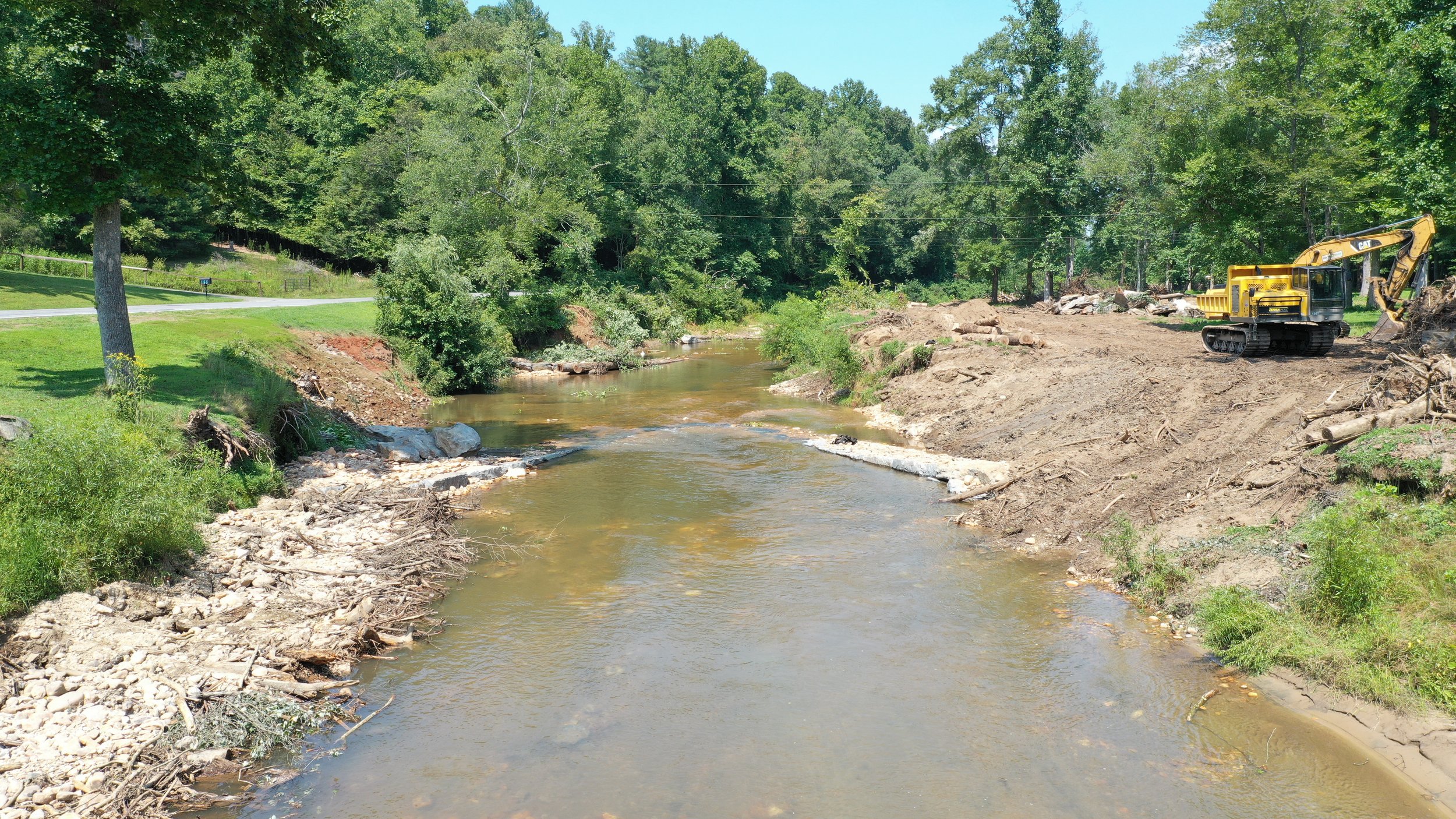Resource Institute and partners restored and stabilized a section of the Mitchell River near the old Kapps Mill Dam. Hurricane Michael devastated the region and cause the old Mill Dam to blow out.
Mountain Park, Surry County, North Carolina
A stream restoration project on the Mitchell River is currently under construction. In October 2018, Hurricane Michael inundated Surry County dropping more than 10 inches of rain in some areas. This torrent of rain blew out the historic Kapps Mill dam along the Mitchell. After the blowout, the stream was flooded with tons of fine, sandy sediment causing extensive erosion and impairing water quality.
Surry County consulted with Resource Institute to find a solution. Surry County and Resource Institute have a strong history of restoring reaches of the Yadkin River watershed. Resource Institute is a nonprofit based in Winston-Salem and specializes in stream restoration. In all, Surry County and Resource Institute have completed 36 river restoration projects restoring and enhancing almost 28 miles of stream in the county.
After meeting with the county and several landowners, Resource Institute partnered with Ecosystem Planning & Restoration (EPR) to assess the situation. The partners found that the Kapps Mill breach released tons of fine sandy sediment stored behind the dam. The stream was trying to reestablish access to its floodplain, causing severe erosion along its streambanks. In some areas, the banks were more than 10 feet high, and in other areas, the stream was cutting into the state road.
Additionally, this section of the Mitchell River is home to a population of Brook Floaters (Alasmidonta varicosa), a species of freshwater mussels. Brook Floaters prefer gravel riffles in well-oxygenated, free-flowing streams. There are only 14 known populations of the Brook Floater in North Carolina (Brook Floater Conservation Plan for North Carolina 2020). This population was at risk because of the excess sediment from the dam. Brook Floaters are not very mobile, and the fine sands from the dam covered their habit and impacted the mussel’s ability to get oxygen and find food.
Resource Institute realigned a section of the Mitchell River and rebuilt the floodplain. The restoration approach uses bioengineering and instream structures to stabilize the streambanks.
With all this in mind, EPR produced design and engineering plans to repair and restore the stream. EPR and Resource Institute use sustainable river engineering technologies based on the “natural channel design” approach to improve the natural stream stability and habitat functions. The plans call for a channel realignment and rebuilding the floodplain. The restoration approach will also use bioengineering and instream structures to stabilize the streambanks.
Currently, North State Environmental is constructing the restoration project. In all, the project will repair and restore 1,500 feet of stream. In-stream construction will be complete in the next few weeks. Early this winter, the project team will return to complete riparian planting. The team anticipates planting 550 trees and 1,650 live stakes and shrubs. The plantings will enhance aquatic and wildlife habitat, also helping to stabilize the streambanks. The riparian planting will also contribute to carbon sequestration. Over ten years, the plantings will sequester 22 tons of carbon.
North Carolina Division of Environmental Quality provided funding for the project. After construction, the landowners, community, and visitors will experience many benefits. The sediment reduction will enhance the water quality in the region – protecting drinking water, fishing, paddling, and other recreation opportunities. The community will benefit economically from recreational users, reduce water treatment costs, and improve the river’s capacity to handle large storm flows.
Charles Anderson, Resource Institute, says, “The Mitchell River is an outstanding water resource. The water quality is spectacular, and the recreational opportunities are tremendous, particularly fishing and paddling. It is important to restore this stretch of the river before the water quality is lowered enough to affect the Brook Floater and other aquatic life. Also, the severe erosion was impacting local landowners. The potential for severe flooding during another big storm was high. This project not only improves water quality, but it also boosts flood resiliency.”
By Paula Worden, Resource Institute
Peer-Reviewed by Ashley Hawkins, Alan Walker & Squeak Smith


